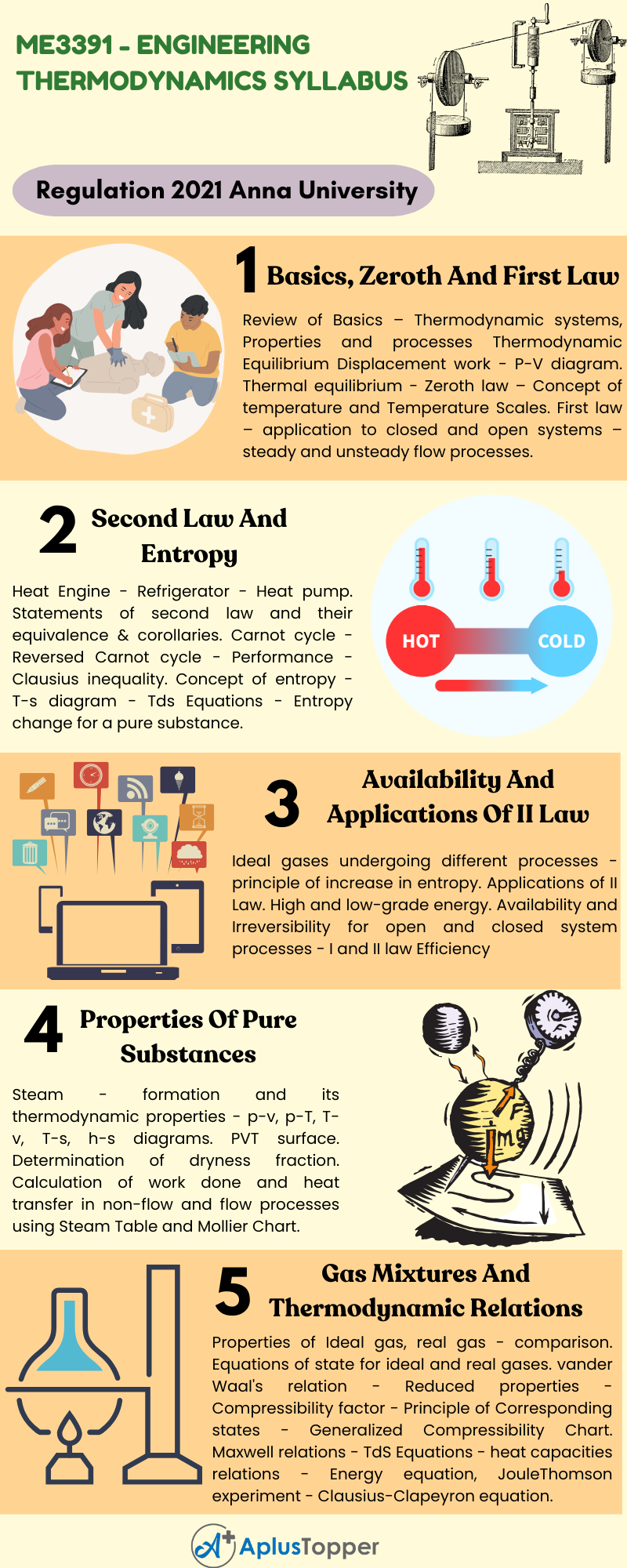Regulation 2021 Anna University Code – ME3391 deals with the semester – III Engineering Thermodynamics Syllabus of B.E Mechanical Engineering. Most of the semester syllabus tries to give both practical and theoretical knowledge to the students. To acquire the proper knowledge regarding the studies to prepare for the examination, need a detailed syllabus right?
This article will assist you in gaining most of the syllabus details. We tried our best to provide the required syllabus info. Chapter-wise syllabus along with reference books written by experts and textbooks added. Hence in this article ME3391 – Engineering Thermodynamics syllabus, we include all the details regarding the examination. Students can easily get all the data regarding the syllabus on one page. Hope you will understand the syllabus. And All the best for your exams. Don’t forget to share it with your friends.
If you want to know more about the syllabus of B.E Mechanical Engineering connected to an affiliated institution’s four-year undergraduate degree program. We provide you with a detailed Year-wise, semester-wise, and Subject-wise syllabus in the following link B.E Mechanical Engineering Syllabus Anna University Regulation 2021.
Aim Of Objectives:
- Impart knowledge on the basics and application of zeroth and first law of thermodynamics.
- Impart knowledge on the second law of thermodynamics in analysing the performance of thermal devices.
- Impart knowledge on availability and applications of second law of thermodynamics
- Teach the various properties of steam through steam tables and Mollier chart.
- Impart knowledge on the macroscopic properties of ideal and real gases.
ME3391 – Engineering Thermodynamics Syllabus
Unit I: Basics, Zeroth And First Law
Review of Basics – Thermodynamic systems, Properties and processes Thermodynamic Equilibrium Displacement work – P-V diagram. Thermal equilibrium – Zeroth law – Concept of temperature and Temperature Scales. First law – application to closed and open systems – steady and unsteady flow processes.
Unit II: Second Law And Entropy
Heat Engine – Refrigerator – Heat pump. Statements of second law and their equivalence & corollaries. Carnot cycle – Reversed Carnot cycle – Performance – Clausius inequality. Concept of entropy – T-s diagram – Tds Equations – Entropy change for a pure substance.

Unit III: Availability And Applications Of II Law
Ideal gases undergoing different processes – principle of increase in entropy. Applications of II Law. High and low-grade energy. Availability and Irreversibility for open and closed system processes – I and II law Efficiency.
Unit IV: Properties Of Pure Substances
Steam – formation and its thermodynamic properties – p-v, p-T, T-v, T-s, h-s diagrams. PVT surface. Determination of dryness fraction. Calculation of work done and heat transfer in non-flow and flow processes using Steam Table and Mollier Chart.
Unit V: Gas Mixtures And Thermodynamic Relations
Properties of Ideal gas, real gas – comparison. Equations of state for ideal and real gases. vander Waal’s relation – Reduced properties – Compressibility factor – Principle of Corresponding states – Generalized Compressibility Chart. Maxwell relations – TdS Equations – heat capacities relations – Energy equation, JouleThomson experiment – Clausius-Clapeyron equation.
Textbooks:
- Nag.P.K., “Engineering Thermodynamics”, 6th Edition, Tata McGraw Hill (2017), New Delhi.
- Natarajan, E., “Engineering Thermodynamics: Fundamentals and Applications”, 2nd Edition (2014), Anuragam Publications, Chennai.
References:
- Cengel, Y and M. Boles, Thermodynamics – An Engineering Approach, Tata McGraw Hill,9th Edition, 2019.
- Chattopadhyay, P, “Engineering Thermodynamics”, 2nd Edition Oxford University Press, 2016.
- Rathakrishnan, E., “Fundamentals of Engineering Thermodynamics”, 2nd Edition, Prentice Hall of India Pvt. Ltd, 2006.
- Claus Borgnakke and Richard E. Sonntag, “Fundamentals of Thermodynamics”, 10th Edition, Wiley Eastern, 2019.
- Venkatesh. A, “Basic Engineering Thermodynamics”, Universities Press (India) Limited, 2007.
Related Posts On Semester – III:
